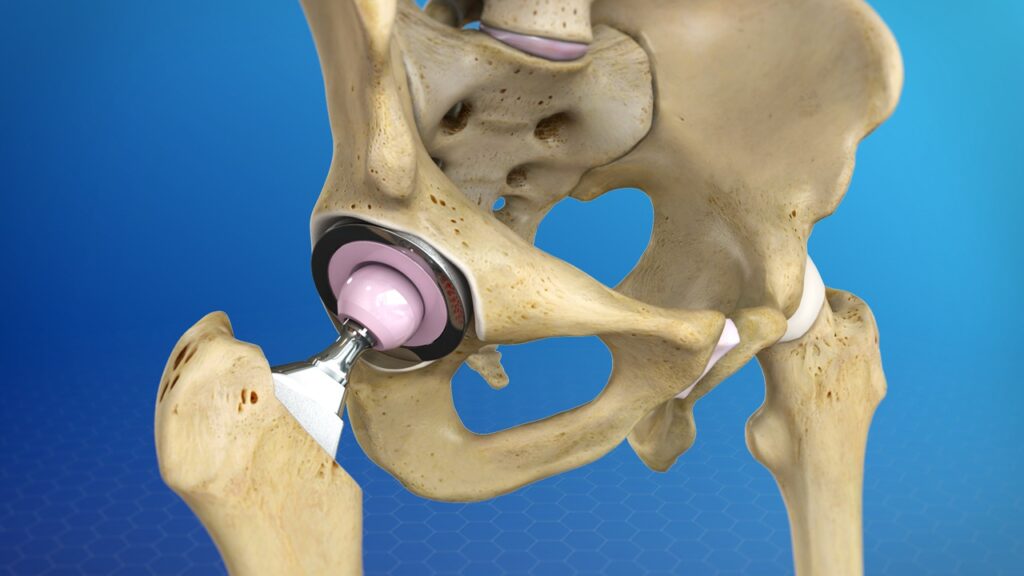Regain Mobility and Relieve Chronic Pain
If you’re struggling with persistent hip pain that interferes with daily life, Total Hip Replacement may be the life-changing solution you need. Whether due to arthritis, injury, or degeneration, when hip pain limits your mobility, affects your sleep, or hinders your quality of life, it's time to consider advanced orthopedic care. This guide explains everything you need to know—from what Total Hip Replacement is to recovery, rehabilitation, and consultation with renowned orthopedic surgeon Dr. Chetan Patil S, who offers the best Total Hip Replacement in Bangalore.
What is Total Hip Replacement?
Total Hip Replacement (THR), also known as total hip arthroplasty, is a surgical procedure where a damaged hip joint is replaced with a prosthetic implant. The goal is to relieve pain, restore mobility, and improve function in individuals suffering from hip joint damage.
The hip joint is a ball-and-socket joint, where the ball (femoral head) at the top of your thigh bone fits into a socket (acetabulum) in your pelvis. In THR, both the ball and socket are replaced with artificial components—usually made of metal, ceramic, or high-grade plastic—that replicate the movement of a healthy joint.
This surgery is commonly recommended for conditions such as:
- Osteoarthritis
- Rheumatoid arthritis
- Post-traumatic arthritis
- Avascular necrosis
- Hip fractures
Treatment Process
1. Diagnosis & Pre-operative Assessment
- The severity of joint damage through X-rays, MRI, or CT scans
- Your pain levels, mobility, and impact on daily activities
- Overall health and medical history
Once Total Hip Replacement is deemed appropriate, you'll undergo pre-operative tests to ensure you're fit for surgery, including blood tests, ECG, and anesthetic evaluation.
2. The Surgical Procedure
During Total Hip Replacement, the procedure typically involves:
- Administering spinal or general anesthesia
- Removing the damaged femoral head
- Preparing the socket (acetabulum) and inserting the prosthetic cup
- Inserting a metal stem into the femur and attaching a new ball
- Ensuring a proper fit and movement before closing the incision
The entire surgery usually takes 1.5 to 2 hours. Minimally invasive techniques may be used depending on the patient’s condition and surgeon’s expertise.
Consultation with Dr. Chetan Patil S
For those seeking the best Total Hip Replacement in Bangalore, Dr. Chetan Patil S is a trusted name in orthopedic surgery. With years of experience in joint replacement and advanced arthroplasty techniques, Dr. Patil is known for his patient-centric approach and high surgical success rate.
At your consultation, you can expect:
- Thorough diagnosis and imaging evaluation
- Clear explanation of surgical and non-surgical options
- A tailored treatment plan focusing on rapid recovery
- Transparent discussion about risks, costs, and post-surgery outcomes
Recovery and Rehabilitation
Immediate Post-Surgery (0–3 days)
- You’ll begin gentle physiotherapy within 24 hours to prevent stiffness and promote circulation.
- Most patients start walking with support on the second or third day.
- Pain will be managed with medications.
Short-Term Recovery (3–6 weeks)
- You will use a walker or crutches initially and gradually transition to a cane or independent walking.
- Light daily activities can be resumed, including personal care and short walks.
- Avoid bending beyond 90 degrees or twisting the operated leg.
Long-Term Rehabilitation (6 weeks – 6 months)
- Physiotherapy will include muscle strengthening, balance training, and range-of-motion exercises.
- By the third month, most people resume low-impact activities like cycling or swimming.
- Full recovery typically occurs within 6 months.
- Dr. Chetan Patil S and his rehabilitation team ensure a closely monitored recovery program with milestone-based progression.
What to Expect After Treatment
After successful Total Hip Replacement, most patients experience:
- Significant pain relief: Chronic joint pain is often eliminated within weeks of surgery.
- Improved mobility: Walking, sitting, and climbing stairs becomes easier.
- Better sleep and quality of life: Reduced discomfort improves overall well-being.
However, it's essential to manage expectations and understand that:
- The artificial joint may not have the full flexibility of a natural hip.
- High-impact sports and activities that strain the joint should be avoided.
- With proper care, hip implants can last 15–20 years or more.
Benefits of Choosing the Best Total Hip Replacement in Bangalore
- Access to experienced surgeons like Dr. Chetan Patil S
- Availability of advanced imaging and surgical technology
- Comprehensive rehabilitation and physiotherapy services
- High standards of hygiene and post-operative care
Bangalore has become a hub for medical tourism, especially for orthopedic surgeries, due to its state-of-the-art infrastructure and affordable treatment packages.
Is Total Hip Replacement Right for You?
You might be a good candidate for THR if:
- You suffer from chronic hip pain that interferes with everyday activities.
- Pain persists even after medication, injections, or physiotherapy.
- You experience stiffness, limping, or need support while walking.
- Imaging shows joint deterioration or deformity.
It’s important to discuss your symptoms and expectations with a qualified orthopedic surgeon like Dr. Chetan Patil S to determine the best course of action.
Book Your Consultation Today
If you are considering Total Hip Replacement for yourself or a loved one, consult Dr. Chetan Patil S, one of the most trusted names for the best Total Hip Replacement in Bangalore. His commitment to excellence, personalized care, and focus on rapid recovery ensures you’re in safe hands.
Say goodbye to joint pain and reclaim your active life—schedule your consultation with Dr. Chetan Patil S today.
FAQs about Total Knee Replacement
Most modern implants last 15–20 years, and many even longer with proper care.
Yes, depending on your job type. Desk jobs can often be resumed in 4–6 weeks, while physically demanding work may take longer.
As with any surgery, risks include infection, blood clots, or implant loosening. However, complications are rare with skilled surgeons.
Some younger patients may eventually need revision surgery, but advances in prosthetics have significantly increased implant longevity.

